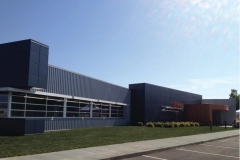Data Centers Bring $1.2 Billion A Year in Taxes Into Virginia’s Economy
Data Centers Bring $1.2 Billion A Year in Taxes Into Virginia’s Economy
The data center industry brings $1.2 billion in tax revenue into the Virginia economy annually, including $1 billion to local municipalities and $174 million to the state, according to a new study from the Northern Virginia Technology Council.
The study quantifies how the growth of cloud computing has created direct economic benefits for Virginia, which is home to the world’s largest concentration of data centers in Loudoun and Prince William counties in Northern Virginia. The study by Mangum Economics also outlined significant job growth, as the data center industry supported over 45,000 jobs in the state, producing $3.6 billion in labor income and $7.5 billion in economic output.
Data centers played a particularly outsized role during the COVID-19 pandemic, representing 62 percent of all new investment in the state in 2021, and 81% of new investment in 2020, according to the Virginia Economic Development Partnership. Data center companies invested $15 billion in new projects in Virginia during the pandemic, spending heavily on capacity to support a shift to digital services, even as many offices and stores curtailed their operations.
“This extraordinary growth of our region’s data centers truly shows the significant capital, innovation and human investment our technology companies have made,” said Jennifer Taylor, NVTC president and CEO. “As the foundation to the modern technology economy, data centers and NVTC members have proven crucial to creating unprecedented tax revenue, and the state’s incentive programs send a clear signal to potential investors worldwide that Virginia is home for technology and innovation.”
Data Center Economics Benefit Local Communities
As the trade association representing regional technology companies, the NVTC clearly has a perspective on the value of cloud computing. That said, the study’s data points document the economic benefits of data centers, and arrives as communities across Northern Virginia are seeking to define the role of digital infrastructure in their economy and landscape.
At Data Center Frontier, we have explored these tensions in a series of stories. Here’s a recap:
- New Data Center Developers Continue to Flock to Northern Virginia
- Growing Pains: Loudoun County Debates the Future of its Data Centers
- The Cloud Needs More Land in Northern Virginia
Economic benefits are always a key point in the discussion of development, and data centers’ impact on local communities doesn’t neatly align with traditional economic development analyses, which historically focus on the number of jobs created. Data centers are highly automated and require fewer full-time jobs than some other industries, but generate significant tax revenue as tech companies invest in servers and data storage equipment to power their Internet operations.
Nonetheless, due to the scale of the cloud presence in Northern Virginia, the job creation outlined in the NVTC/Mangum report is meaningful:
- In 2021, the data center industry in Virginia provided approximately 5,550 operational jobs and almost 10,000 construction and manufacturing jobs.
- For every job inside a Virginia data center, there are 4.1 additional jobs that are supported in the rest of the Virginia economy, with 45,460 supported jobs in 2021.

Graphic: NVTC/Mangum Economics)
The Mangum analysis noted that communities see particular benefits in the way that data center tax revenues can support services. Because of their employment profile, these facilities provide meaningful income to counties, but lower impact on schools and roads than other employers.
This has particular benefits when it comes to funding schools, particularly in Virginia, a state which partially funds local education through the state budget. As a result, the state tax revenues from data centers that flow through to local school districts more than offset the cost to educate the children of data center employees.
“According to our estimates, in the absence of data centers in Loudoun and Prince William Counties, the State of Virginia would have to reallocate $90.5 million in state education
funding away from other Virginia localities to provide $73 million in additional funding to Loudoun County, and $17.5 million in additional funding to Prince William County,” Mangum notes in its report.
Study: Competition is Growing, and Incentives Matter
Northern Virginia is the dominant market in the U.S., with total cloud capacity that exceeds the next five largest markets combined. Its competitive position would seem to be unassailable, but the NTC report noted that market activity can shift quickly in the cloud era, and regions like New York/New Jersey that were once leading destinations have lost ground.
A component in Virginia’s success has been an incentive package offering sales and use tax exemptions to data centers that make a minimum new capital investment of $150 million and create at least 50 new jobs in Virginia. In March of 2021, Virginia revised its sales and use tax exemption to require only 10 new employees and $70 million of capital investment for data centers in places where the unemployment and poverty rates are higher than statewide averages. The measure is designed to extend data center development beyond the cloud clusters in Northern Virginia.
As local officials and community groups debate the best locations for data centers – and whether they should be prohibited from some areas – the NVTC noted that other states are adopting targeted incentive packages to attract data center development. More than 30 states offer incentives to attract data centers, including 26 with sales and use tax incentives that last for 10 years or more, with 11 of them having incentives that are valid indefinitely.
Maryland, Pennsylvania and Connecticut have all recently passed or embellished their incentive packages, hoping to attract new data center development, or at least slow the volume of businesses from their state that are moving IT operations to Northern Virginia’s cloud cluster.
The Virginia General Assembly recently passed bills that would standardize the way municipalities tax data center property, as some entities use different methodologies to assess “fixtures” such as electrical and mechanical equipment. The industry has supported the bills, which would offer predictability in how equipment is taxed. The measures are currently awaiting action by Gov. Glenn Youngkin.
“Data centers are the major drivers of investment in Virginia and we look forward to seeing the continued growth of the industry in the years ahead,” said Vinay Nagpal, chairman of NVTC’s data
center and cloud committee. “It is through the hard work and collaboration of our members, tech leaders and innovators, along with Northern Virginia’s technology-rich culture, that places the National Capital region on the map as a major player in the industry.”
NVTC said that sponsors of this report included CloudHQ, Digital Realty, Dominion Energy, Fairfax Economic Development Authority, Iron Mountain, Loudoun County Virginia Economic
Development, Microsoft, Prince William Economic Development and VISA.
More >> Data Centers Bring $1.2 Billion A Year in Taxes Into Virginia’s Economy


